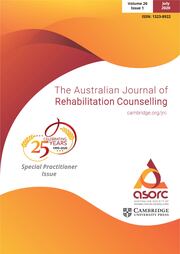Article contents
Can Motivational Interviewing be Truly Integrated with Person-centered Counselling?
Published online by Cambridge University Press: 16 June 2015
Abstract
This article examines whether Motivational Interviewing (MI) can be truly integrated with Carl Rogers' person-centered approach (PCA) to counselling. While the ‘spirit’ of MI has much in common with PCA, it is argued that the theory and practice of MI indicates several fundamental differences with PCA that distinguishes the ways that each perspective may contribute to rehabilitation counselling. These differences are discussed in relation to the unique aspects of their underlying assumptions, how they define clients' problems, and how they articulate the role of counsellor and successful outcome. Recent meta-analyses have indicated the beneficial aspects of both approaches. Empirical evidence for the efficacy of both MI and PCA is strong across a diverse range of client groups and health care settings. However, the highly variable effectiveness of both MI and PCA suggests that further process-outcome research is needed. Implications for rehabilitation counsellors are discussed.
- Type
- Review Article
- Information
- The Australian Journal of Rehabilitation Counselling , Volume 21 , Issue 1 , July 2015 , pp. 77 - 87
- Copyright
- Copyright © The Author(s) 2015
References
- 1
- Cited by




